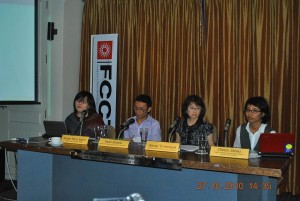 BANGKOK, Thailand — Members of human rights organizations in Southeast Asia have given the Asean Intergovernmental Commission on Human Rights (AICHR) a failing mark for its performance in its first year.
BANGKOK, Thailand — Members of human rights organizations in Southeast Asia have given the Asean Intergovernmental Commission on Human Rights (AICHR) a failing mark for its performance in its first year.
The assessment by the Solidarity for Asian Peoples’ Advocacies (SAPA) Task Force on ASEAN and Human Rights, a network of human rights organizations and advocates, was conducted at the same time that the 10 leaders of the Association of Southeast Asian Nations gathered in Hanoi for their 17th summit.
Cheery Zahau, program coordinator of Human Rights Education Institute of Burma Rights, said: “Because of its inaction on the increasing and systematic human rights violation in Burma where thousands of people are held in prisons for exercising their political rights I gave AICHR a negative score.”
Atnike Sigiro, ASEAN advocacy department manager for Forum Asia, said that they found fundamental flaws in the core documents of AICHR, like its Terms of Reference, adding that the human rights body has a defective mandate to start with.
Reading from the statement issued by the SAPA Task Force on ASEAN and Human Rights, Sigiro said: “The AICHR has operated within the framework of its flawed founding architecture and has not demonstrated any apparent effort to address or overcome them.”
The AIHCR was set up in compliance with Article 14 of the Asean Charter, which states that Asean shall establish a human rights body to promote and protect the human rights and fundamental freedoms of the people in the region.
SAPA dismissed AICHR as just a “window dressing for ASEAN’s commitment to human rights.”
Wanee Thitiprasert of the Asia Pacific Forum on Women, Law and Development lamented the slow pace of the adoption of the Rules of Procedures (RoP ) as well as the reluctance of the Commission to recognize and engage with civil society stakeholders in the region.
Debbie Stothard of the ALTSEAN Burma said that AICHR’s poor performance reflected most ASEAN government’s stance on human rights and their views on civil society participation. She said at last month’s ASEAN Peoples’ Forum in Hanoi , they experienced “interference” and “censorship” by government representatives.
Ryan Silverio of the Southeast Asia Coalition Against the Use of Child Soldiers agreed with Stothard and said that the same thing happened during the ASEAN Children’s Forum held in the Philippines earlier this month where most participants were selected by the governments and not by the children and youth themselves.
Silverio said: “The ASEAN Children Forum was organized in a non-transparent way. Some of the participants were chosen by the governments. It reinforces the issue of transparency. Participation is a right. The children and the youth sector should be given the power to identify their own representatives to the Forum.”
Zahau said they submitted cases of human rights violation in Burma and heard nothing from the ASEAN body.
She said: “While I see little hope with AICHR as a body I urge other member-countries of AICHR such as Indonesia and Thailand to help us by conducting public hearings and exacting accountability from the military regime in Rangoon and call for an end to human rights violation in the country.”
Philippine President Benigno S. Aquino III Thursday met with Myanmar Prime Minister Thein Sein at the sidelines of the Asean Summit in Hanoi and discussed the situation of detained democracy icon Aung San Suu Kyi, according to Secretary Ricky Carandang, head of the Presidential Communications Development and Strategic Planning Office.
Carandang, in a press conference after the bilateral meeting, said Thein Sein did not give a concrete commitment for Suu Kyi’s release and only said legal processes would be taken in her case.
ASEAN is composed of Brunei Darussalam, Cambodia, Indonesia, Laos, Malaysia, Myanmar,Philippines, Singapore, Thailand, and VietNam.
Photo by Jonal Javier
